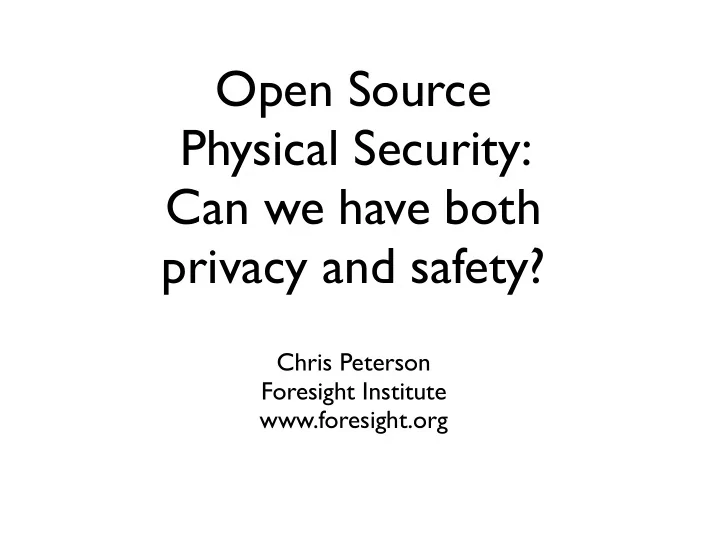

Open Source Physical Security: Can we have both privacy and safety? Chris Peterson Foresight Institute www.foresight.org
Please check the logic
"The best weapon of a dictatorship is secrecy, but the best weapon of a democracy should be the weapon of openness." —Niels Bohr
No Secret Software for Public Voting Data! The E-voting mess — We could have nipped it in the bud.
The Future • It’s not just electronic • It’s material as well • Molecules matter as much as bits • A big part of the future — and the future of freedom — is nanotech
Nanotech: 3 stages Materials Devices Systems
One molecule Nanotech can do it now too
Nanotech- based sensors “The detector generates a continuous 'spectrum' of information about any chemical agents in its presence...” “ easily programmable ”
Sewer monitoring has begun “The test doesn’t screen people directly but instead seeks out evidence of illicit drug abuse in drug residues and metabolites excreted in urine and flushed toward municipal sewage treatment plants.”
“We found a drug molecule — Everybody out for a breath check!”
Things worth detecting: weapons of mass destruction • Explosives, chemicals, nukes — today • Bioweapons – in early stages — nasty, but delicate and hard to control) • Nanoweapons — later — like bioweapons, but tougher and more controllable)
Technological Advance Cost of WMD comes down $ GDP per capita goes up Time
Fear + poor WMD data = Sudan pharmaceutical plant, August 1998
Result: more surveillance Electronic, video, biological, chemical Being integrated into national system
Transparency vs privacy DC doesn’t notice our debates — they just move forward
Top-down approach to bottom-up problem • Centralized • Mandatory • Monolithic • Limited in participation • Secretive • Leads toward Surveillance State
Bottom-up physical security • Decentralized • Minimal “Track the • Voluntary/privatized problem, not the • Experimental people” • Collaborative • Open • Transparent
Who can figure out whether & how to collect public sensing data? • Need a community that understands the relationships between: • Security • Privacy • Functionality • Freedom
Graphic: Gina Miller
Open Source Physical Security: What would it be like? • Open source style development • Citizen controlled • Privacy oriented • Verifiably limited • Detects materials of concern • Does not track individuals or nonweapons (e.g. drugs)
What might we regard as worth detecting? • Real problems • Anthrax (NYC, DC, FL 2001) • Sarin (Tokyo, 1995) • Ricin (London 2002, Las Vegas 2008)
Who gets the data? • Communities negotiate • Mutual data exchange, e.g. anthrax within 100 km • Agreements on how to treat the data • “Communities” size can vary from household to nation, depending on what is detected (e.g., TNT vs nukes)
Proposed law in New York City that will require people to get a license before they can buy chemical, biological, or radiological attack detectors Do we not have a “freedom to sense”?
“Who would have guessed that the folks with the pocket protectors would turn out to be the ones with the right stuff?” —LA Times
Mechanical geek Electrical geek
Graphic: Gina Miller
NO SECRET SOFTWARE FOR PUBLIC SENSING DATA! Open Source Physical Security
or
• Email me: BOF tonight peterson @ foresight.org 8:30 PM • BOF tonight, 8:30 pm • Foresight Vision Weekend, Nov. 15-16, Silicon Valley No Secret Software for Public Sensing Data!
Recommend
More recommend